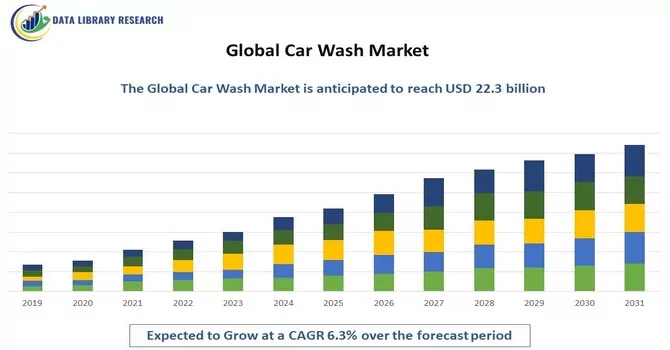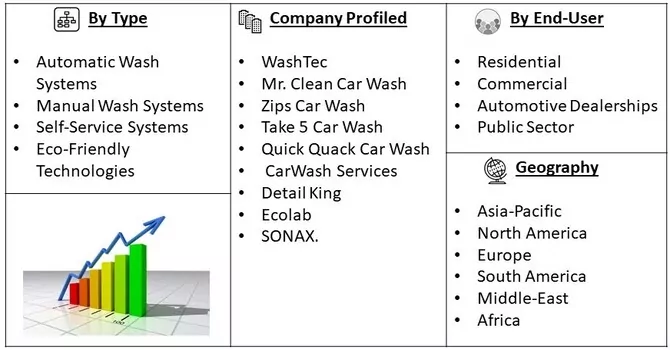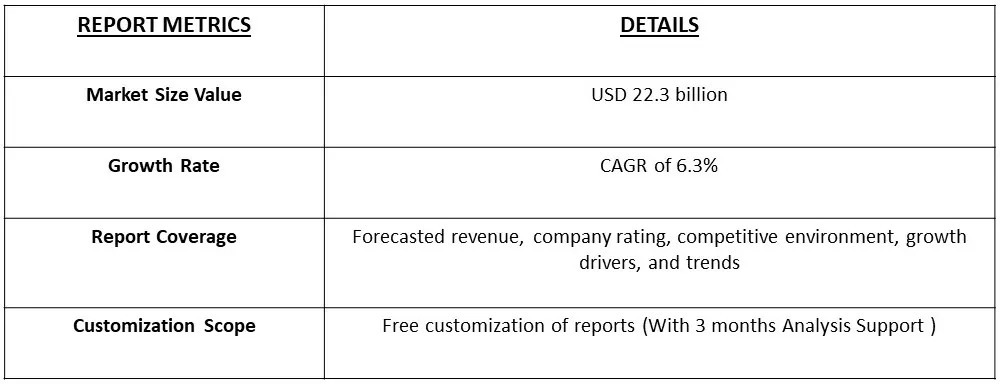The global car wash market is expected to reach a value of approximately USD14.6 billion in 2023, growing at a compound annual growth rate (CAGR) of around 5.5% from 2020 to 2023. The global car wash market is expected to reach a value of around USD 22.3 billion by 2030.

Get a Complete Analysis Of The Report - Download a Free Sample PDF
The global car wash market refers to the industry that provides cleaning and maintenance services for vehicles, encompassing a range of business models and technologies. The market includes automatic car washes, self-service car washes, and full-service car washes, as well as mobile car washes and detailing services. It serves both residential and commercial customers, including individual vehicle owners, fleet operators, and dealerships. The market is driven by factors such as increasing vehicle ownership, growing demand for convenience and time-saving services, and the need for regular vehicle maintenance to ensure safety and longevity. As a result, the global car wash market is expected to experience steady growth, driven by technological advancements, changing consumer preferences, and increasing adoption of eco-friendly and sustainable practices.
The is experiencing significant growth, driven by the increasing demand for convenient, efficient, and eco-friendly vehicle cleaning services. Consumers are increasingly opting for professional car wash services to save time and achieve better results, particularly in regions like North America and Europe where busy lifestyles and stringent environmental regulations favour water-efficient, automated systems. The market is also seeing innovation with the integration of advanced technologies like water recycling systems, touchless washing, and mobile app-based services, catering to the demand for convenience and sustainability. However, challenges such as high initial investment costs for advanced equipment and the seasonal nature of the business in some regions could temper growth. Overall, the global car wash market is poised for steady expansion, supported by technological advancements and evolving consumer preferences.
The global car wash market is witnessing a paradigm shift towards sustainability, with a growing emphasis on eco-friendly and water-conserving technologies. The trend towards digitalization is also transforming the industry, with the adoption of mobile apps, online booking systems, and data analytics to enhance customer experience and optimize operations. Additionally, the rise of autonomous vehicles is expected to create new opportunities for car wash providers to develop specialized services and technologies to cater to this emerging market. Furthermore, the increasing focus on vehicle safety and maintenance is driving demand for premium car wash services, including detailing and protection packages. As a result, car wash providers are adapting to these trends by investing in innovative technologies, expanding their service offerings, and enhancing their customer experience to stay competitive in the market.
Market Segmentation:
The Global Car Washing Market is segmented by technology (Automatic Wash Systems, Manual Wash Systems, Self-Service Systems and Eco-Friendly Technologies), End-User Industry (Residential, Commercial, Automotive Dealerships and Public Sector) and geography (Asia-Pacific, North America, Europe, South America, and Middle-East and Africa). The report offers the market size and forecasts for revenue (USD million) for all the above segments

For Detailed Market Segmentation - Download Free Sample PDF
Market Drivers:
Increasing Vehicle Ownership and Urbanization:
The rising global vehicle ownership, particularly in developing regions, is a key driver of the car wash market. As more people move to urban areas, where access to residential space for washing cars is limited, there is a growing reliance on professional car wash services. In densely populated urban centers, the convenience of automated and professional car washes becomes more appealing as it saves time and effort.
Additionally, the expanding middle class in emerging markets is contributing to increased vehicle purchases, further boosting the demand for car washing services. This trend is particularly strong in countries like China, India, and Brazil, where rapid urbanization and economic growth are leading to higher disposable incomes and greater access to automobiles. As the global vehicle fleet continues to grow, the need for regular maintenance and cleaning services will drive the expansion of the car wash market.
According to the International Organization of Motor Vehicle Manufacturers (OICA), global vehicle sales reached a record high of 92.1 million units in 2020, with Asia-Pacific being the largest market. Moreover, the United Nations estimates that the global urban population will reach 6.7 billion by 2050, with Asia-Pacific and Africa being the fastest-growing regions. This growth is driving demand for personal vehicles and car wash services. Thus, such factors are overall fueling to growth of the market.
Shift Towards Environmental Sustainability:
Environmental concerns and stricter regulations are pushing the car wash industry towards more sustainable practices, which is driving the adoption of water-efficient and eco-friendly technologies. Traditional car washing methods often involve excessive water usage and harmful chemicals that can pollute the environment. In response, many car wash operators are investing in advanced systems that minimize water consumption, recycle water, and use biodegradable cleaning agents. Governments and local authorities in regions like Europe and North America are also implementing policies that encourage the adoption of greener practices, further propelling the market forward.
Also, Car wash operators are seeking green certifications, such as the ISO 14001 environmental management standard, to demonstrate their commitment to environmental sustainability. For example, a leading car wash chain, Quick Quack Car Wash, has achieved ISO 14001 certification for its environmental management system. Thus, such certifications for car washing are leading the industry towards more sustainable practices, thereby driving the market.
Consumers, too, are becoming more environmentally conscious, preferring car wash services that align with their values. This shift towards sustainability not only meets regulatory requirements but also appeals to a growing segment of eco-conscious customers, making it a significant driver of innovation and growth in the global car wash market.
Market Restraints:
The global car wash market faces several restraints that could hinder its growth. One significant challenge is the high initial capital investment required for setting up automated and technologically advanced car wash facilities. These systems, while efficient and popular, require substantial financial outlays for equipment, installation, and maintenance, making it difficult for small operators or new entrants to compete. Additionally, the seasonal nature of the car wash business in many regions, particularly those with harsh winters, leads to fluctuating demand, creating cash flow challenges and reducing profitability during off-peak periods. Another restraint is the growing environmental regulations in various regions, which, while driving sustainability, also increase operational costs as businesses need to invest in water recycling systems, eco-friendly chemicals, and compliance measures. Moreover, the intense competition within the market, especially in urban areas, can lead to price wars and reduced profit margins. Lastly, economic downturns or slowdowns can adversely affect consumer spending on non-essential services like car washing, further restraining market growth. These factors collectively pose challenges to the expansion of the global car wash market, particularly for smaller businesses and regions with less stable demand.
The COVID-19 pandemic had a mixed impact on the global car wash market. In the early stages of the pandemic, lockdowns, travel restrictions, and reduced vehicle usage led to a significant decline in demand for car wash services as consumers stayed home and avoided non-essential activities. Many car wash businesses, particularly small and independent operators, faced temporary closures or severe reductions in customer traffic, leading to revenue losses. However, as the pandemic progressed and hygiene became a top priority, there was a renewed focus on cleanliness and sanitation, including vehicle hygiene.
This shift in consumer behavior helped revive demand, particularly for contactless and automated car wash services that minimized human interaction and enhanced safety. The crisis also accelerated the adoption of digital payment methods and mobile-based booking systems, which catered to the growing preference for contactless transactions. Despite the initial setbacks, the car wash market began to recover as restrictions eased and consumers resumed driving, with some operators adapting quickly to the new normal by offering more flexible, safe, and convenient services.
Segmental Analysis:
Automatic Wash Systems Segment is Expected to Witness Significant Growth Over the Forecast Period
The automatic wash systems segment in the Global Car Washing Market has seen significant advancements with the introduction of sophisticated tunnel washers, conveyor systems, and robotic washers. These systems are designed to provide efficient, high-throughput washing solutions that cater to both individual and fleet needs. Recent developments include the integration of smart technology, which allows for real-time monitoring and automated adjustments to optimize wash quality and resource usage. The driving factors for this segment include increasing consumer demand for convenience, the desire for consistent and high-quality wash results, and the efficiency of automated systems in reducing labor costs and time. Additionally, technological innovations such as touchless and hybrid wash systems are enhancing customer satisfaction by minimizing vehicle damage and improving overall wash performance.
Commercial Segment is Expected to Witness Significant Growth Over the Forecast Period
The growing commercial end-user segment in the Global Car Washing Market is driven by the increasing need for efficient and high-quality vehicle maintenance among businesses with large fleets. Commercial entities such as rental car companies, delivery services, and corporate fleets are increasingly investing in car wash solutions to ensure their vehicles remain clean and presentable, which is essential for maintaining a professional image and operational efficiency. The rise of on-demand services and the expansion of logistics and transportation sectors further fuel this demand. Recent trends include the adoption of automated wash systems and self-service options that offer cost-effective and scalable solutions for high-volume washing needs. Additionally, advancements in technology, such as the integration of fleet management software with car wash systems, enable businesses to optimize their washing schedules and monitor vehicle cleanliness in real-time. The driving factors for this growth include the need to maintain vehicle aesthetics, the desire for operational efficiency, and the cost benefits of regular, automated cleaning solutions.
Asia Pacific Region is Expected to Witness Significant Growth Over the Forecast Period
The use of car washing services in the Asia-Pacific region is experiencing significant growth, driven by rapid urbanization, increasing vehicle ownership, and rising disposable incomes. As cities across Asia-Pacific expand, there is a growing need for efficient and accessible car maintenance solutions. This trend is further supported by a burgeoning middle class with a higher focus on vehicle upkeep and appearance. Recent developments include the expansion of car wash infrastructure, such as automatic wash systems and self-service stations, which cater to the region's high population density and busy lifestyles. Additionally, there is a notable shift towards eco-friendly car wash solutions as environmental awareness increases. Government initiatives and policies promoting water conservation and reducing pollution also contribute to the adoption of sustainable car wash technologies. The growing commercial sector, including fleet operators and car rental services, further drives demand for consistent and high-quality car washing. This surge in usage reflects a broader trend towards modernization and enhanced consumer services in the Asia-Pacific region.
The competitive landscape of the Global Car Washing Market is dynamic and diverse, characterized by the presence of several key players leveraging various technologies and service models to capture market share. These companies compete based on technological innovation, service efficiency, and customer experience. Their strategies involve advancements in automatic and self-service systems, incorporation of eco-friendly practices, and expansion into emerging markets. As the industry evolves, firms are focusing on enhancing service quality, implementing sustainable solutions, and adopting digital technologies to differentiate themselves in a competitive market.
Major competitors in this space include:

Get a Complete Analysis Of The Report - Download a Free Sample PDF
Recent Development:
1) In 2024, Mister Car Wash, a leading car wash chain, launched a new eco-friendly car wash technology that uses a proprietary water recycling system to reduce water consumption by up to 75%. This innovative technology is designed to minimize the environmental impact of car washing, while also providing a superior cleaning experience for customers. The system uses a combination of advanced filtration and treatment technologies to recycle and reuse water, reducing the amount of wastewater discharged into the environment. This development is expected to set a new standard for the industry, as other car wash operators seek to adopt similar technologies to reduce their environmental footprint.
2) In 2023, Washos, a popular mobile car wash app, has expanded its services to include a range of premium car wash options, including detailing and protection packages. This move is designed to capitalize on the growing demand for premium car wash services, as consumers increasingly seek high-quality and convenient car wash solutions. The app's new features include advanced detailing services, such as paint correction and ceramic coating, as well as protection packages that provide long-term protection for vehicles. This expansion is expected to drive growth for Washos, as the company continues to disrupt the traditional car wash industry with its innovative mobile app and premium services.
Q1. What are the driving factors for the Car Washing market?
The driving factors for the car washing market include increasing vehicle ownership, which heightens the demand for regular vehicle maintenance, and growing urbanization, which necessitates efficient and convenient car washing solutions in densely populated areas. Rising disposable incomes enable consumers to spend more on vehicle care and appearance. Technological advancements, such as automated and eco-friendly car wash systems, drive market growth by offering enhanced efficiency, quality, and sustainability.
Q2. What are the restraining factors for the Car Washing market?
The car washing market faces several restraining factors, including high initial investment costs for advanced washing equipment and infrastructure, which can be a barrier for new entrants and small businesses. Additionally, the potential for operational costs, such as water usage and maintenance expenses, can impact profitability. Environmental regulations, while promoting sustainability, may also increase compliance costs and require adaptation to stricter standards. Seasonal fluctuations in demand, particularly in regions with extreme weather conditions, can affect revenue consistency. Furthermore, competition from DIY car washing solutions and home-based cleaning methods presents a challenge, as some consumers prefer cost-effective, at-home alternatives over professional services.
Q3. Which segment is projected to hold the largest share in the Car Washing market?
The automatic wash systems segment is projected to hold the largest share in the car washing market. This is due to their ability to provide efficient, high-throughput washing solutions that cater to both individual and fleet needs. Automatic systems, including tunnel washers and conveyor systems, offer a high level of convenience and consistency, which is increasingly valued by consumers and businesses alike. Their growing adoption is driven by technological advancements that improve wash quality and operational efficiency, along with the rising demand for time-saving and hassle-free car care solutions. As urbanization and vehicle ownership continue to rise, the scalability and performance of automatic wash systems make them a dominant force in the market.
Q4. Which region holds the largest share in the Car Washing market?
North America holds the largest share in the car washing market. This region's significant market presence is driven by high vehicle ownership rates, advanced infrastructure, and a strong preference for both convenience and quality in vehicle maintenance. The widespread adoption of automated and self-service car wash systems, coupled with a well-established network of car wash facilities, supports North America's dominant position. Additionally, the region's high disposable incomes and focus on maintaining vehicle aesthetics further bolster demand for professional car washing services.
Q5. Which are the prominent players in the Car Washing Market?
• WashTec • Mr. Clean Car Wash • Zips Car Wash • Take 5 Car Wash • Quick Quack Car Wash • CarWash Services • Detail King • Ecolab • SONAX.
Data Library Research are conducted by industry experts who offer insight on industry structure, market segmentations technology assessment and competitive landscape (CL), and penetration, as well as on emerging trends. Their analysis is based on primary interviews (~ 80%) and secondary research (~ 20%) as well as years of professional expertise in their respective industries. Adding to this, by analysing historical trends and current market positions, our analysts predict where the market will be headed for the next five years. Furthermore, the varying trends of segment & categories geographically presented are also studied and the estimated based on the primary & secondary research.
In this particular report from the supply side Data Library Research has conducted primary surveys (interviews) with the key level executives (VP, CEO’s, Marketing Director, Business Development Manager and SOFT) of the companies that active & prominent as well as the midsized organization
FIGURE 1: DLR RESEARH PROCESS

Extensive primary research was conducted to gain a deeper insight of the market and industry performance. The analysis is based on both primary and secondary research as well as years of professional expertise in the respective industries.
In addition to analysing current and historical trends, our analysts predict where the market is headed over the next five years.
It varies by segment for these categories geographically presented in the list of market tables. Speaking about this particular report we have conducted primary surveys (interviews) with the key level executives (VP, CEO’s, Marketing Director, Business Development Manager and many more) of the major players active in the market.
Secondary ResearchSecondary research was mainly used to collect and identify information useful for the extensive, technical, market-oriented, and Friend’s study of the Global Extra Neutral Alcohol. It was also used to obtain key information about major players, market classification and segmentation according to the industry trends, geographical markets, and developments related to the market and technology perspectives. For this study, analysts have gathered information from various credible sources, such as annual reports, sec filings, journals, white papers, SOFT presentations, and company web sites.
Market Size EstimationBoth, top-down and bottom-up approaches were used to estimate and validate the size of the Global market and to estimate the size of various other dependent submarkets in the overall Extra Neutral Alcohol. The key players in the market were identified through secondary research and their market contributions in the respective geographies were determined through primary and secondary research.
Forecast Model
